|
TRANSLATE THIS ARTICLE
Integral World: Exploring Theories of Everything
An independent forum for a critical discussion of the integral philosophy of Ken Wilber
 David Christopher Lane, Ph.D.
Professor of Philosophy, Mt. San Antonio College Lecturer in Religious Studies, California State University, Long Beach Author of Exposing Cults: When the Skeptical Mind Confronts the Mystical (New York and London: Garland Publishers, 1994) and The Radhasoami Tradition: A Critical History of Guru Succession (New York and London: Garland Publishers, 1992). David Christopher Lane, Ph.D.
Professor of Philosophy, Mt. San Antonio College Lecturer in Religious Studies, California State University, Long Beach Author of Exposing Cults: When the Skeptical Mind Confronts the Mystical (New York and London: Garland Publishers, 1994) and The Radhasoami Tradition: A Critical History of Guru Succession (New York and London: Garland Publishers, 1992).
THE AGNOSTICS
Thinkers in an Indeterminate Cosmos
Introduction |
Isaiah Berlin |
Charles Darwin |
John Dewey |
Enrico Fermi |
David Hume |
Edmund Husserl |
Thomas Henry Huxley |
Thomas Kuhn |
Lynn Margulis |
John Maynard Keynes |
G.E. Moore |
Karl Popper |
Michael Schmidt-Salomon |
Herbert Spencer |
Leo Szilard
THOMAS HENRY HUXLEYBrian Tam
Thomas Henry Huxley was born in Ealing, England in 1825. He was a successful English zoologist and natural scientist and was best known as “Darwin's Bulldog” for his advocacy of Charles Darwin's theory of evolution and natural selection. During Huxley's lifetime, the majority of his works were focused on comparative anatomy and science. Although he is not widely regarded as a philosopher, his several incursions he made into the field of philosophy is also remarkable. In addition to his advocacy of Darwin's theories, he coined the term 'agnosticism' to relate his philosophical position in the uncertainty of the objective truth. 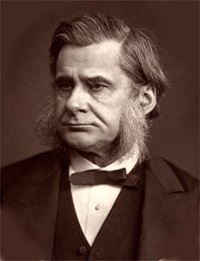 Thomas Henry Huxley Huxley was born to a middle-class family which had fallen on hard times. In his childhood, he only had received two years of formal schooling from Great Ealing School, where his father was a mathematics teacher at the same school. He later educated himself to became one of the most notable autodidacts of the nineteenth century. Inspired by the religious atmosphere from Great Ealing School, it sparked his enthusiasm in the field of science and religion. When he was self-teaching himself, he intensively read books from famous figures like Thomas Carlyle, James Hutton, and Sir William Hamilton, focusing on fields such as science, history, and philosophy. This intense absorption of such a wide approach to education planted the seeds of Huxley's agnosticism and scientific passion. Huxley had extraordinary talent in learning new languages; he taught himself German, Greek, and Latin. He was so fluent in German, in fact, that he was competent to become the translator for many of Charles Darwin's works, making them much more accessible in Europe. Possessing such spectacular language talent, he was able to read Greek philosophical works in their original, including the sophisticated texts from Aristotle's pen. At the age of 15, Huxley began his career as a medical apprentice, and later on, he became the professor and president of the Royal Society at the age of 26. He was awarded several awards, including the Royal Medal, Darwin Medal, and Clarke Medal, etc. The term “agnosticism” was coined at a meeting of the Metaphysical Society in 1876. According to Huxley, “Agnosticism is not properly described as a 'negative' creed, nor indeed as a creed of any kind, except in so far as it expresses absolute faith in the validity of a principle, which is as much ethical as intellectual. This principle may be stated in various ways, but they all amount to this: that it is wrong for a man to say that he is certain of the objective truth of any proposition unless he can produce evidence which logically justifies that certainty. This is what Agnosticism asserts; and, in my opinion, it is all that is essential to Agnosticism.” Regarding Huxley's statement, it is clear that the word agnosticism simply means that humans should not believe in things that do not have any sufficient evidence to logically or scientifically prove they exist.. There is a little difference between atheism and agnosticism. Atheism has the certainty to reject god existence; agnosticism claims that the existence of god is unknown or knowable as it cannot be proved by reason. When it comes to talking about which assertion they claim besides agnosticism, Huxley stated, “Henceforward, I might hope to hear no more of the assertion that we are necessarily Materialists, Idealists, Atheists, Theists, or any other ists, if experience had led me to think that the proved falsity of a statement was any guarantee against its repetition. And those who appreciate the nature of our position will see, at once, that when Ecclesiasticism declares that we ought to believe this, that, and the other, and are very wicked if we don't, it is impossible for us to give any answer but this: We have not the slightest objection to believe anything you like, if you will give us good grounds for belief; but, if you cannot, we must respectfully refuse, even if that refusal should wreck morality and insure our own damnation several times over. We are quite content to leave that to the decision of the future. The course of the past has impressed us with the firm conviction that no good ever comes of falsehood, and we feel warranted in refusing even to experiment in that direction.” In this statement, Huxley provided a solid stance in his attitude in agnosticism. Regardless of which religion one follows, one must provide logically firm evidence to support their belief. If the evidence is not provided, then it is not valid. Huxley admits that there are many topics that are out of the reach of his faculties, and beyond a comprehensive knowledge set. Huxley defines that agnosticism is a method and not prescribed creed. One of the arguments against such thinking came from the Principal of King's College, London, Henry Wace, who alleged that agnostics were infidels. As stated by Van Harvey, Professor of Religious Studies at Stanford University, “Wace had argued that agnostics hide behind the claim that they do not know about the supernatural to cover over their active disbelief in the authority of Jesus Christ and the 'unpleasantness' that attaches to the term 'infidel'.” Huxley has greatly influenced famous figures like Henry Osborn, H. G. Wells, and Sir E. Ray Lankester, etc. Today, agnosticism has become much more widely accepted and is not disparaged as it was in previous times. The following quote from Agnosticism and Christianity provides a glimpse into Huxley's brilliant thinking: The people who call themselves 'Agnostics' have been charged with doing so because they have not the courage to declare themselves 'Infidels.' It has been insinuated that they have adopted a new name in order to escape the unpleasantness which attaches to their proper denomination. To this wholly erroneous imputation, I have replied by showing that the term 'Agnostic' did, as a matter of fact, arise in a manner which negatives it; and my statement has not been, and cannot be, refuted. Moreover, speaking for myself, and without impugning the right of any other person to use the term in another sense, I further say that Agnosticism is not properly described as a 'negative' creed, nor indeed as a creed of any kind, except in so far as it expresses absolute faith in the validity of a principle, which is as much ethical as intellectual. This principle may be stated in various ways, but they all amount to this: that it is wrong for a man to say that he is certain of the objective truth of any proposition unless he can produce evidence which logically justifies that certainty. This is what Agnosticism asserts; and, in my opinion, it is all that is essential to Agnosticism. That which Agnostics deny and repudiate, as immoral, is the contrary doctrine, that there are propositions which men ought to believe, without logically satisfactory evidence; and that reprobation ought to attach to the profession of disbelief in such inadequately supported propositions. The justification of the Agnostic principle lies in the success which follows upon its application, whether in the field of natural, or in that of civil, history; and in the fact that, so far as these topics are concerned, no sane man thinks of denying its validity. Still speaking for myself, I add, that though Agnosticism is not, and cannot be, a creed, except in so far as its general principle is concerned; yet that the application of that principle results in the denial of, or the suspension of judgment concerning, a number of propositions respecting which our contemporary ecclesiastical 'gnostics' profess entire certainty. And, in so far as these ecclesiastical persons can be justified in their old-established custom (which many nowadays think more honoured in the breach than the observance) of using opprobrious names to those who differ from them, I fully admit their right to call me and those who think with me 'Infidels'; all I have ventured to urge is that they must not expect us to speak of ourselves by that title. The extent of the region of the uncertain, the number of the problems the investigation of which ends in a verdict of not proven, will vary according to the knowledge and the intellectual habits of the individual Agnostic. I do not very much care to speak of anything as 'unknowable.' What I am sure about is that there are many topics about which I know nothing; and which, so far as I can see, are out of reach of my faculties. But whether these things are knowable by anyone else is exactly one of those matters which is beyond my knowledge, though I may have a tolerably strong opinion as to the probabilities of the case. Relatively to myself, I am quite sure that the region of uncertainty—the nebulous country in which words play the part of realities—is far more extensive than I could wish. Materialism and Idealism; Theism and Atheism; the doctrine of the soul and its mortality or immortality—appear in the history of philosophy like the shades of Scandinavian heroes, eternally slaying one another and eternally coming to life again in a metaphysical 'Nifelheim.' It is getting on for twenty-five centuries, at least, since mankind began seriously to give their minds to these topics. Generation after generation, philosophy has been doomed to roll the stone uphill; and, just as all the world swore it was at the top, down it has rolled to the bottom again. All this is written in innumerable books; and he who will toil through them will discover that the stone is just where it was when the work began. Hume saw this; Kant saw it; since their time, more and more eyes have been cleansed of the films which prevented them from seeing it; until now the weight and number of those who refuse to be the prey of verbal mystifications has begun to tell in practical life. It was inevitable that a conflict should arise between Agnosticism and Theology; or rather, I ought to say, between Agnosticism and Ecclesiasticism. For Theology, the science, is one thing; and Ecclesiasticism, the championship of a foregone conclusion as to the truth of a particular form of Theology, is another. With scientific Theology, Agnosticism has no quarrel. On the contrary, the Agnostic, knowing too well the influence of prejudice and idiosyncrasy, even on those who desire most earnestly to be impartial, can wish for nothing more urgently than that the scientific theologian should not only be at perfect liberty to thresh out the matter in his own fashion; but that he should, if he can, find flaws in the Agnostic position; and, even if demonstration is not to be had, that he should put, in their full force, the grounds of the conclusions he thinks probable. The scientific theologian admits the Agnostic principle, however widely his results may differ from those reached by the majority of Agnostics. But, as between Agnosticism and Ecclesiasticism, or, as our neighbours across the Channel call it, Clericalism, there can be neither peace nor truce. The Cleric asserts that it is morally wrong not to believe certain propositions, whatever the results of a strict scientific investigation of the evidence of these propositions. He tells us 'that religious error is, in itself, of an immoral nature.' He declares that he has prejudged certain conclusions, and looks upon those who show cause for arrest of judgment as emissaries of Satan. It necessarily follows that, for him, the attainment of faith, not the ascertainment of truth, is the highest aim of mental life. And, on careful analysis of the nature of this faith, it will too often be found to be, not the mystic process of unity with the Divine, understood by the religious enthusiast; but that which the candid simplicity of a Sunday scholar once defined it to be. "Faith," said this unconscious plagiarist of Tertullian, 'is the power of saying you believe things which are incredible.' Now I, and many other Agnostics, believe that faith, in this sense, is an abomination; and though we do not indulge in the luxury of self-righteousness so far as to call those who are not of our way of thinking hard names, we do feel that the disagreement between ourselves and those who hold this doctrine is even more moral than intellectual. It is desirable there should be an end of any mistakes on this topic. If our clerical opponents were clearly aware of the real state of the case, there would be an end of the curious delusion, which often appears between the lines of their writings, that those whom they are so fond of calling 'Infidels' are people who not only ought to be, but in their hearts are, ashamed of themselves. It would be discourteous to do more than hint the antipodal opposition of this pleasant dream of theirs to facts. Further Reading3. A Scientific Education: Essays from a Naturalist 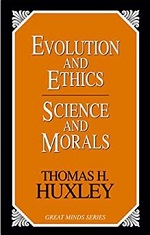 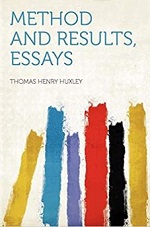 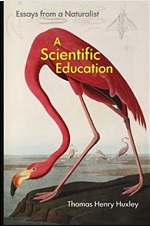 FROM THE INTRODUCTION | DAVID LANE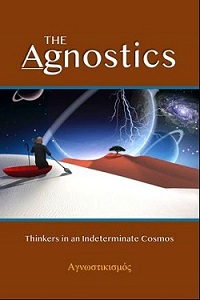
Often in the philosophy classes I have taught in undergraduate and graduate school, I would bring up this point of “unknowingness.” Pointing to a crumpled piece of writing paper, I would ask the class, “What is this?” Almost in unison, the students would respond, "A piece of paper." Taking this as my cue to lead into a deeper philosophical investigation of materialism, I probed further, "Yes, but what is that?” Catching my drift, one student invariably answered, “Oh, it is actually a transformed sheet of wood.” Not wanting them to stop there, I asked, “And wood is made of what?” “It's comprised of molecules," the more scientifically oriented students would shout. Connecting to the now forgotten inner space ride at Disneyland, which takes one through an imaginary voyage inside a snowflake molecule, I queried, “But what is a molecule made of.” By this time, we had gotten down to the subatomic level, and our words began to betray our modicum of knowledge (electrons, protons, quarks, lucky charms, superstring). The final question I asked was quite simple, but given the line of investigation it led to some severe complications: What is matter? Well, it should be obvious to the reader as it was to my class and to myself that there's only one truly appropriate response, “I don't know.” Now, this is exactly the response not only of most mystics, but most quantum physicists as well. As Sir Arthur Eddington, the distinguished astronomer put it, “Something unknown is doing we don't know what!” To be sure, mystics have said that the world (or matter) is nothing but consciousness. But, what is consciousness? Not even a sage as enlightened as Ramana Maharshi of South India could answer that question. To such queries, Ramana would often sit in silence. Ultimately, matter leads to consciousness and consciousness to God or Nature (with a capital N) and both to Mystery. However, no matter how you define it, slice it, categorize it, blend it, intuit it, the fact remains that Reality is a Mystery, and nobody apparently (not me, not you, not Einstein) knows what that Reality is. We are sitting right in the middle of the Mystical Dimension.
Comment Form is loading comments...
|